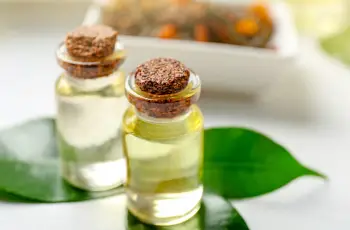
Eucalyptus Oil in Skin Care: Benefits, Risks, and Best Uses
Eucalyptus oil, also known as Eucalyptus globulus, is a popular essential oil used in fragrances, personal care products, and even therapeutic skin treatments.
It’s praised for its anti-inflammatory, antimicrobial, and antioxidant properties. But like any strong ingredient, it’s not ideal for every skin type.
Here’s everything you need to know about eucalyptus oil in skin care, including what it does, where to use it, and when to avoid it.
What Kind of Oil Is Eucalyptus Oil?
Eucalyptus oil is a plant-based essential oil, extracted from the leaves of the eucalyptus tree. It’s not a carrier oil or a dry oil, as it doesn’t contain fatty acids or lipids.
It has a thin texture, spreads easily on the skin, and absorbs quickly. Despite its name, it’s not technically an oil in the moisturizing sense.
Because it lacks fatty acids, eucalyptus oil isn’t ideal for deep hydration like oils such as jojoba or argan. But it shines in other areas, especially in skin treatments.
What Are the Active Compounds?
Eucalyptus oil is packed with natural chemical compounds, each offering its own benefit. Here are some of the most important:
α-pinene: A powerful anti-inflammatory.
Eucalyptol (8-cineole): Known for antimicrobial and antioxidant activity.
Terpenes: Add soothing and protective qualities.
Aldehydes and ketones: Help kill bacteria and reduce infections.
One study found 63 distinct compounds in eucalyptus oil, showing how rich and complex this ingredient really is.
Eucalyptus Oil Benefits for Skin
Let’s explore what eucalyptus oil can do for your skin:
1. Antimicrobial Protection
Eucalyptus oil kills bacteria, fungi, and viruses on the skin. It’s especially useful in cleansers and acne products.
2. Anti-inflammatory Effects
This oil helps reduce redness, swelling, and irritation caused by breakouts or environmental stress.
3. Antioxidant Activity
Antioxidants in eucalyptus oil fight free radicals and oxidative stress, which can contribute to wrinkles and aging.
4. Hydrating Support
While it’s not a moisturizer on its own, eucalyptus oil supports ceramide production, which improves moisture retention and strengthens the skin barrier.
5. Improved Skin Barrier
By boosting ceramides, it helps protect the skin from water loss and external irritants.
Common Uses of Eucalyptus Oil in Skin Care
Eucalyptus oil appears in many skincare and hair care products. You’ll often find it in:
Face cleansers and acne washes, Shampoos and scalp treatments, Anti-aging serums and creams, Body washes and exfoliants, Fragranced lotions and oils
It also contributes to product stability by preventing bacterial growth and oxidation, making it a natural preservative.
Eucalyptus Oil in Hair Care
Eucalyptus oil isn’t just good for your skin—it’s excellent for your hair and scalp too.
Benefits for Hair:
Hydrates dry scalp, Reduces flaking and itching, Supports hair follicle health, Improves scalp circulation, Strengthens hair shafts
Many hair growth products feature eucalyptus oil, like Viviscal’s Thin to Thick range. It works well alongside ingredients like caffeine, UV blockers, or keratin.
Is Eucalyptus Oil Safe for Skin?
In most topical applications, yes—it’s safe. However, there are important warnings to consider:
1. Toxic If Ingested
Eucalyptus oil is highly toxic when consumed. Never ingest it or use it near your mouth.
2. Possible Irritation
It may sting or irritate the skin, especially on broken or sensitive areas.
3. Common Allergen
Some people are allergic to eucalyptus oil. Always patch test before full use.
4. Avoid in Rosacea
It can worsen rosacea symptoms, causing flare-ups or redness.
The EWG safety rating ranges from 4 to 6 depending on use. This is mostly due to ingestion risks and allergy potential.
Who Should Use Eucalyptus Oil?
Let’s break it down by skin type and condition:
✔️ For Acne-Prone Skin
Eucalyptus oil fights acne-causing bacteria without clogging pores. It’s non-comedogenic and helps reduce inflammation, making it ideal for acne treatments.
⚠️ For Sensitive Skin
Use with caution. If you don’t have rosacea or allergies, you might benefit from its anti-inflammatory effects. Always test first.
❌ For Rosacea
It’s one of the top irritants for rosacea-prone skin. Avoid entirely.
❓ For Dry Skin
It may help mildly dry skin by boosting ceramides. But it lacks fatty acids, so for severely dry skin, richer oils like shea butter are more effective.
✔️ For Hyperpigmentation
Eucalyptus oil has tyrosinase-inhibiting properties. It may help reduce melasma, sunspots, or post-inflammatory hyperpigmentation when used with other brighteners.
✔️ For Wrinkles
Its antioxidants can help reduce fine lines and protect skin from free radical damage. It’s best used as part of a broader anti-aging routine.
Best Ingredients to Pair With Eucalyptus Oil
Eucalyptus oil works best when combined with other skin-enhancing ingredients:
Niacinamide – Reduces inflammation and brightens skin.
Licorice Extract – Fades dark spots and improves tone.
Ferulic Acid – Antioxidant boost and UV protection.
Cysteamine – Fights melasma and dark patches.
Vitamin C – Brightens and protects skin from aging.
Side Effects of Eucalyptus Oil
While many people benefit from eucalyptus oil, it can cause some unwanted effects:
Burning or stinging on sensitive skin
Allergic reactions like rashes or swelling
Contact dermatitis with prolonged or undiluted use
Worsening of rosacea symptoms
If any of these occur, stop using the product and consult a dermatologist.
How to Use Eucalyptus Oil Safely
To enjoy the benefits without risking irritation:
Dilute properly – Never use essential oils undiluted on your skin.
Use patch testing – Apply a small amount behind your ear or on your forearm first.
Avoid eye area – Keep eucalyptus away from eyes and mucous membranes.
Do not ingest – It’s toxic when taken orally, even in small amounts.
Summary: Pros and Cons of Eucalyptus Oil in Skin Care
Pros:
Strong antimicrobial effects
Anti-inflammatory and antioxidant properties
Non-comedogenic and lightweight
Boosts ceramides and skin barrier function
Brightens skin and fights hyperpigmentation
Supports scalp and hair health
❌ Cons:
Irritating to sensitive skin
Unsafe if ingested
Can worsen rosacea
Risk of allergic reaction
Final Thoughts
Eucalyptus oil is a powerful, multi-functional ingredient in skin and hair care. It helps fight acne, soothe inflammation, improve skin texture, and protect against aging.
But it’s not for everyone.
If you have sensitive skin, rosacea, or a history of allergies, you may want to avoid it—or consult your dermatologist before use.
If you’re unsure whether eucalyptus oil is right for your skin, take a skin type quiz and build your routine around your personal skin needs.


